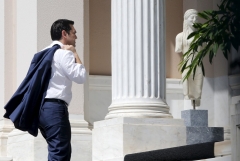
Over the weekend, European leaders forced Greece to implement more cuts, privatisations and removal of labour laws, while refusing to cancel any of the country's debt. Wolfgang Münchau, writing in the Financial Times, has said European countries have "reverted to the nationalist European power struggles of the 19th and early 20th century". Ambrose Evans-Pritchard in the Telegraph says the agreement "offers no conceivable way out the country's perpetual crisis".
Greece's economic crisis has already lasted over five years, in which time the economy has shrunk by a quarter, two-thirds of young people have become unemployed and one in five people now live in absolute poverty. The latest deal forced on Greece by the rest of the Eurozone is to keep following the same policies, only more so. Which is like finding an even larger wall to bang your head against to cure your headache.
At the heart of the failure to deal with the crisis is the insistence by several European governments such as Germany that only borrowers, not lenders, are responsible for debt. And that a debt should always be repaid, no matter what the consequences. These bizarre views of what is moral are the opposite of Jesus' teachings. In the Gospels, the verb Jesus is recorded to have used the most means to cancel, liberate or forgive a debt.
Greece had a large, though not increasing, government debt coming into the 2008 global financial crisis, fuelled by loans from German, French, US and British banks, with Goldman Sachs helping the then government hide the extent of the debt from the Greek people. The debt then began increasing rapidly in 2008 when trade and tourism revenues fell with the global banking crisis and banks actually wanted to lend more to Greece, seeing it as a safe haven.

In 2010, this boom in lending came to an end when speculators realised Greece could not repay. But rather than reckless lenders sharing in the costs of this debt trap, the IMF and EU lent more money to Greece, 92 per cent of which was used to repay banks and other companies such as hedge funds. At the same time, the IMF and EU insisted on government spending cuts, privatisations and removal of labour laws, which the IMF has admitted has just made the situation worse.
In 2010, this strategy was opposed by developing countries at the IMF, such as India, Argentina and Brazil, who said the bailout was just for banks rather than Greece, that the policies would crash the economy, and the crisis would continue for years to come. The EU and US overrode them and pushed through the bank bailout regardless.
One reason developing countries knew the bank bailout and austerity would not work, alongside common sense, is that exactly the same was done to them in the 1980s and 1990s, primarily to save the profits of US, UK and Japanese banks. During this 'Third World Debt Crisis', economies in Latin America and Africa stagnated for 20 years. In sub-Saharan Africa, 125 million more people were pushed into extreme poverty. It was only when some debts began to be cancelled in the 2000s that countries began to recover.
Debt cancellations – debt jubilees – date back to ancient times such as biblical debt cancellations as outlined in Nehemiah. They have continued into modern times. In 1953, governments including Greece cancelled half of Germany's debt, and made payments on the other half conditional on Germany receiving the income from trade to do so. This helped lay the basis for both Germany and Europe's economic success through the 1950s and 1960s.
The suffering imposed on the people of Greece in the name of maintaining European bank profits is morally outrageous. Eventually a significant amount of Greece's debt will need to be cancelled, but the more it is drawn out, the longer this crisis will be for both Greeks and people across Europe.
Please join a Europe-wide campaign and sign this petition for a European conference to agree debt cancellation for Greece, funded by recovering money from the banks and financial speculators who were the real beneficiaries of bailouts.
Tim Jones is policy officer for the Jubilee Debt Campaign.

















